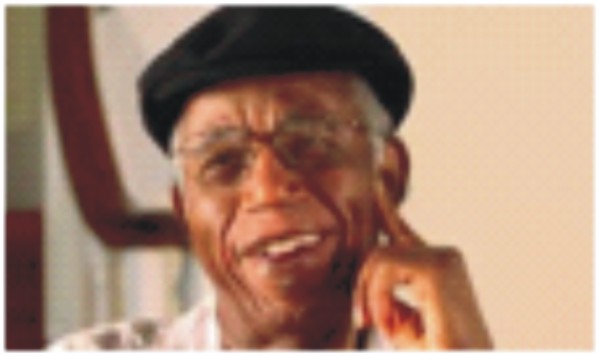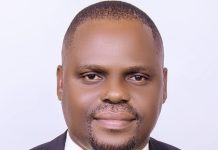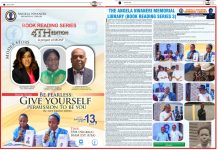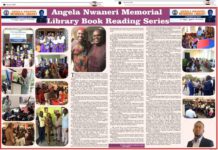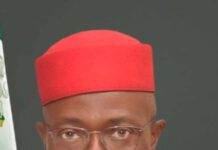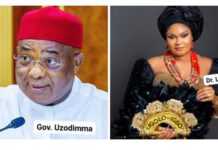By Dr Sam Iheanacho Madugba, DPH, MBBS(Nig), MPH(Nig) (08037110950 ,e-mail: sammadugba@yahoo.com)
A. Introduction : Achebe’s Things Fall Apart: A Holistic Approach
Chinua Achebe in Things Fall Apart, 1958, a book written some fifty years ago, in a subtle revolutionary drive, brought the cosmology of the Igbo nation to international consciousness. The copy of this book which I have has been with me since 1975 when as a Class Three student, I was introduced to advance Literature-in-English in Ngor-Okpala High School, Owerri. In this 182-paged classical novel , a book generously translated into more than forty five languages from its original English edition. Achebe dwelt on all aspects of Igbo life and existence , birth, adolescence, adulthood, death, marriage, naming ceremony, governance, communication, rule of law, taboos, medicine, worship, music , sports competitions, wars, title-taking, ambitions and destiny, to mention but a few. He asserted in distinct language spiced with proverbs and idioms, that the Igboman, nay, the African, had a consummate civilization before the Whiteman came to cause the disintegration of Igbo society, originally built on truth, justice, equity, dignity, order and respect for the elders; when he introduced lifestyles, a religion and a government quite alien to the Igboman, his land and his ancestors.
In one of his sermons at St Patrick’s Catholic Church, Mbutu-Okohia in 1988, Monsignor Professor Theophilus Okere corroborating the African view that the European destroyed our land by trying to convert us to his culture, accused the courts of teaching our people how to lie under oath, an assertion confirmed recently when former President Bill Clinton of the United States of America lied under oath to his American countrymen in the Monica Lewinsky moral saga.
It is the aspect of the Igbo concept of medical practice that I have chosen to discuss in this paper out of about one hundred and thirty subtitles suggested by the organizers of this first international conference on Igbo civilization being held in Owerri, the Capital City of Imo State, the Eastern Heartland, this first month of the Year, 2009.
The fact of my choice is basic . I am a medical practitioner with bias to Public Health which can be likened to the intellectual, political, informative and administrative wing of Medicine . Achebe, the author of Things Fall Apart, and even Wole Soyinka, the Nobel laureate, we were told, went to the University College, Ibadan to study Medicine and Surgery, being, very brilliant young men. But Muse frustrated them out of the medical school early enough before they could cut their teeth in that science of human life and handed them pen and paper to pursue the art of human perception and presentation which they have done very perfectly well in the past fifty years.
I happen to have compelled myself to stick to medicine for six years during my undergraduate days but Muse was more generous to me than Achebe and Soyinka for it allowed me to write six books of Literature without compromising my medical ambition as I came out at term. I therefore feel motivated to actualize the dream of Achebe in his pet adolescent medical ambition by looking at his concept of traditional African Medicine as enunciated in his Things Fall Apart and relate it to what he would have been writing had he finished as a medical doctor.
B. Indigenous Medical Practice As A Culture-Bound Theory and Health Theory of Diseases
George M. Foster (1978) holds that a disease is a pathological concept which is different from illness which is a cultural concept. The Cultural Concept is used in interpreting the former by society. For instance, in certain African cultures, haematuria, that is, urinating frank blood by a man, is seen as an evidence of his maturity while in the medical or pathological parlance, the victim has an attack of Schistosomiasis, which erodes his vesical vessels thereby producing blood. In the cultural contest, a wife should be sought for him, while in the other, he needs the attention of a medical doctor. The Culture-Bound Theory of Diseases according to Sam Madugba, (2003), is a product of universal acceptance that diseases cannot only be explained by other known and classical theories of man but that the culture of a people influences their appreciation of health and diseases. There are other theories of diseases, for instance the cure of Naaman of Syria of his Leprosy by Prophet Elisha as recorded in 2nd Kings, Chapter 5, is a Historical Theory. The concept that diseases are caused by man’s total environment, physical, biological and chemical, where there are isolated causative agents of diseases, disease transmitters, radiation, perhaps causing loss of libido, and even food poisoning as in entire family death following the consumption of wild mushroom meals is the Medical Theory of Diseases. Malaria was earlier referred to as mal air (bad air) until Ross discovered that mosquitoes transmit it.
Sigmund Freud according to Olayiwola A. Erinosho (1978), saw diseases through the analysis of the unconscious and other innate primitive drives in human kind; which he illustrated with the Greek mythology of Oedipus. This is the Psychological Theory of Diseases which other psychologists like Laing and Cooper contradicted with the Conspiratorial Theory as related to Schizophrenia and mania, when relations conspire to deprive an endowed relation of his inheritance by declaring him mad, a thing once done, leaves a stigma.
Indigenous medical practice of the Igboman is based on the Culture-bound Theory where the natural, preternatural and supernatural forces join hands to determine the causality, diagnosis, management, prevention and prognosis of diseases. To this end, Sam Madugba (2003) insists that a Nigerian believes in the physical world where disease agents including weapons of mass destruction can cause morbidity, infirmity and mortality even though the occupiers of either the preternatural realm (witches, sorcerers, magicians, spirits of evil men and women, etc) and those of the supernatural realm (gods, ancestors, deities, etc) must have been at work to allow things to happen. A man falls off a palm tree and dies. Divinations are made to determine the cause of the fall even though he may have used a brittle rope and later, an ancestor whose burial rites may not have been adequately performed emerges to be placated with extortionate sacrifices to prevent more falls and deaths in his family.
Though these theories differ in concept, there are universals which cut across cultures like linking diseases to preternatural and supernatural worlds. Almost every culture relates hygienic environments to ill-health, hence sweeping the kitchen after cooking and eating food, though there are fundamental influences of different theories. The Igboman may not agree that a woman should sweep the kitchen at night, either not to sweep off the tails of benevolent spirits which come to eat his left-over or denying the womb-bound spirits their food, thereby preventing conception. But this neglect of sanitation can lead to breeding of rodents, and rodents can transmit Plague, Lassa fever, etc. Even though all cultures respond to pain stimulus , David Mechanic (1968) proposed the illness behaviour of the Zborowski Study in a London hospital among Jews, Americans and Irishmen who react violently to pain, mildly to pain and stoically to pain respectively. In fact, there is no health care provider, traditional or orthodox who has not experienced recoveries which can only be explained as miracles, thus confirming universality.
The indigenous medical practice is therefore a Culture-bound Theory of Diseases since it incorporates speculations, divinations, magic, necromancy, hypnotism, etc, which even determine the nature of the roots and herbs to be given a sick man, as well as the course of treatment, prevention and prognosis, though we concede that there are roots and herbs that have active ingredients, needing isolation, and there are real native doctors versed in their use.
Foster (1978) defined a Health Care Theory or System which is different from a Disease Theory or System in that the former “is concerned with the way in which societies organize (themselves) to care for the sick and to utilize disease knowledge to aid the patient.” The Health Care Theory which includes the role of social institutions in the planning and execution of effective medical attention to a patient is universal but cultural differences abound. The family system, matters of illness behaviour, playing the sick role and the patient role, as the case may be, with significant others being in charge, are the ingredients of this system.
Since life, illness and death are communal, the Health care theory involves everybody, each with his pocket of ideas in the management of patients. A child with a convulsion may be desired for orthodox medical attention by the educated relation, while more mature ones suggest and in fact, enforce the roasting of the child over a smoking fire and the skull of a monkey hung on his neck to control the gigaga or dike ukwu. Because decision is always social, by the time agreement is reached to institute medical treatment, valuable time is lost and the patient may die.
C. Orthodox Medicine As a Medical Theory of Diseases
The medical theory as a scientific and empirical method of disease management believes in the physical, biological and chemical factors in the environment as the cause of disease. In terms of a communicable disease, there are disease agents (the seed), the transmitting agent, vector or vehicle – (the climate) and the susceptible host (the soil); A. O. Lucas & H. M. Gilles (1998). There have to be these three elements for a disease to be established. The disease agent itself must find a way of leaving its reservoir, remaining viable outside him, infecting the new host and propagating in it . Example here is Malaria or AIDS. In non-communicable diseases like Diabetes Mellitus or Hypertension, there are multifactorial causes such as heredity, environment, food habit, and psychology.
Management is, of course, based on proper diagnosis of a disease done in the clinic by a qualified medical practitioner who employs the Disease Theory System which Foster (1978) says “embraces beliefs about the nature of illness, the remedies and the curing techniques.” So, the medical doctor bases his diagnosis on clerking of patients which includes one-on-one interview with his patients, physical examination, diagnosis, treatment and the ordering for necessary laboratory investigations to confirm his working diagnosis. Treatment of diseases is by the use of chemical, physical, psychological and biological intervention scientifically tasted. A child with Kwashiorkor is treated with protein-based food. Alexander Flemming in 1925, discovered the Penicillin as a magic bullet that saved the world from the Bubonic Plague of earlier years. A patient with Stroke is given antihypertensives if the stroke is caused by hypertension and sent for physiotherapy, to be done by a physiotherapist .
Prevention of diseases is also done scientifically. Primary prevention is by health promotion, (good nutrition, health education, etc) and Environmental Sanitation. Edward Jenner discovered the Small-pox Vaccine which was used in making that dreaded viral disease a thing of the past. BCG and nearly eight other vaccines are now given to children to prevent them from contracting Tuberculosis, and other child-hood killer diseases. This is secondary prevention.
Iodine is added to salt to prevent goiter, and Fluorine is added to tooth pastes to prevent dental caries. Oral Rehydration Therapy, ORT, is offered a stooling and vomiting child to restore homeostatic balance. In HIV and other related diseases, Screening is employed to detect the infected. Prognosis is also based on Science. Experience has taught that unless by divine intervention, a 25-year-old male patient diagnosed of Cancer of the Liver will die within six months. Rehabilitation is equally scientific. Medical prostheses like false legs, dentures are provided for amputees and victims of tooth extraction respectively. Prospects of diseases are also scientifically predicted. HIV vaccines are being tested by HIV/AIDS drug scientists to determine what the future holds for the world tormented by the incurable virus since 1981.
D. Elements of Health and Indigenous Medical Practice in Things Fall Apart
Throughout the book, Things Fall Apart Chinua Achebe deliberately displayed his knowledge of indigenous medical practice as well as the potency of the Culture-bound Theory of Diseases. A few examples will surfice:
i) On P.11 – Achebe portrays Medicine as a spirit when he declares that the most potent war medicine of Umuofia people is an old woman hopping on one leg – agadi nwanyi .
ii) Similarly on P.11 , the agadi nwanyi medicine has a shrine, showing that medicine may equally have a home . Again, Okonkwo has a medicine house near his barn where he keeps the wooden symbols of his ancestors and chi, his personal god.
iii) The hypothesis of disease and epidemic causation is highlighted in the linking of these with curses and abominations as depicted by the oracle fore-warning Obiako, the wine-tapper of an accidental fall should he continue to climb palm trees, P.19; by Ezeani, the priest of Ani , punishing Okonkwo for breaking the Peace Week, P.28; by Obierika reprimanding Okonkwo for participating in the killing of lkemefuna who calls him father as such abomination can wipe out a whole family, PP. 60-61 . Okonkwo’s death, by suicide, is an abomination. P.186 requiring sacrifices. .
iv) Sacrifices offered to gods, ancestors as primary preventive medicine against epidemics as seen in the punishment of Okonkwo by Ezeani, P. 28 and on P. 36 where Okonkwo used new yam and palm oil to offer sacrifice to the Ifeajioku deity for bumper harvest and the protection of his family.
v) Medical consultation as to the diagnosis of ailments and fortunes by priests and priestesses as can be seen on P. 15 when Umuofians go to the Oracle of Hills and Caves to consult their gods, the spirit of their dead ancestors, and when Unoka, the lazy father of Okonkwo goes to the Oracle to diagnose the cause of his poor harvests, P. 16.
vi) The priest is presented as both doctor and fortune teller , as the spirits he consults prescribe sacrifices and even, treatment modalities, P. 15.
Vii) Necromancy is depicted on P.15 to P.16 above just as Saul went to the witch of Endor to consult the spirit of Samuel (Cf 1st Samuel Chap. 28)
vii) Dregs of palm-wine is given to Igwelo, Nwadike’s eldest son who “ has a job in hand”, having married a new wife, P. 19. Palm-wine dregs here could either serve as an Aphrodisiac or a spermatogenic drug.
viii) Treatment of diseases, like vomiting, with physical intervention as in Artificial respiration was depicted by Nwoye’s mother placing a hand on Ikemefuna’s chest and back (winding-out manoeuvre) to control his fear-induced vomiting. P.25. Similarly, Okonkwo in PP. 77-78 treated his daughter, Ezinma who had Iba (Malaria, Typhoid Fever or even Hepatitis) by placing her wholly covered with wrapper or mat, before a steaming pot of assorted leaves, even though Okonkwo was no medicine man.
ix) Ignorance of the Disease process due to lack of scholarship is portrayed by the neglect and casting of people who develop abdominal and leg swellings into the evil forest while alive so that they can die there, to avoid calamity to the community P. 16. Such swellings could be a process of cardiac or renal failure. This kind of preventive medicine where the sick is deprived of care, is an act of wickedness.
x) Ikemefuna’s killing by Okonkwo brought the memory of twins crying in the bush to Nwoye, Okonkwo’s eldest son . That the Oracle permitted the killing depicts that unprovoked murder is also preventive medical practice. P. 55. The throwing away of the four sets of twins of Nneka, Amadi’s wife was a strong stimulus to her proselytization into the religion of the Whiteman which welcomes twins and their mothers without harm to the community, P. 138.
xi) The preternatural concept of disease causation is practised in Obodoani, where their bad custom of casting the corpses of people who die during the Peace Week into the evil forest , yields multiples of evil spirits which harm the living, P. 20.
xii) Childhood malnutrition is promoted as it is forbidden to give children “ such delicacies as eggs”, a rule broken several times by Ekwefi, Okonkwo’s second wife, who gives Ezinma, her only daughter, eggs. Here equally, ignorance plays a part both in malnutrition and in forbidding egg consumption. The egg has the protein, Albumin, whose molecules are two heavy for the renal tubules of the child apart from having been implicated in the causality of allergies in some children.
xiii) Secondary prevention of diseases by the inoculation of roots and herbs, ogwu, into people ( ie, mgbushi ahu ), is rampant in Umuofia . Elders, strong in ogwu, were the only ones that followed the provoked egwugwus to the house of Enoch who killed an ancestral spirit by unmasking him. P. 169 .
xiv) The hypothesis of re-incanation or Ogbanje which persists today in Igboland is clinically portrayed in the death of nine children of Ekwefi who are said to have died within the ages of three years only to return to torment their mother. Pp. 70-77. Cure of Ezinma after Okagbue Uyanwa, the specialist in Ogbanje had excavated her Iyi uwa is also preventive. Okonkwo and his wife, Ekwefi probably had the AS genotype each, hence the SS products they were producing in Mendelian Genetic Theory , until Ezinma, the sickly AS child with the Sickle Cell trait.
Can we now ascribe the mutilation of Ogbanje children to autopsy? Can’t we ascribe the use of medicine to steal a goat from its owner in the market and replacing it with a log of wood,.P.103, as a form of hypnosis in modern psychiatry? Or the elimination of the powers of the deities by the new faith , P. 132-133, such that outcasts shaved their heads on the orders of Mr. Kiaga, the missionary, without harm, as superstition, even though, the over-zealous Okoli who killed the royal python died the next day, P.143-144, showing that the god’s can fight for themselves? But can’t Okoli’s death be related to the syndrome of fear and anxiety or perhaps, a surreptitious assassination by the adherents of the royal python cult as the case is today with the notorious Okija Shrine?
E. The Igbo Concepts of Diseases, Ancient And Modern
Most African writers of the Achebean era used their writings to make a pronouncement on African Concept of Diseases which we have affirmed, border on the Culture-bound Theory of Diseases, Health Care Theory and the influence of the super and preternature on the causality, diagnosis, treatment, prevention, prognosis of diseases and even rehabilitation of patients.
Diseases are caused or sent. They do not occur. When a village woman who Theophilus Okere says in his T.V. Reflections, is in a permanent state of malnutrition and up to middle age, almost also in a permanent state of pregnancy, suffers dizziness and falls, an enemy is responsible. Our people are therefore bound by their own limitations as Catherine Acholonu (1985) would want us o believe in her Spring’s Last Drop, since according to her, life and death are like eating and defecating, a mere routine.
In The Concubine, Elechi Amadi vividly describes how the spiritual husband of Ihuoma, directed her son’s arrow into the stomach of Emenike, her suitor, which proved fatal, especially as the Igbo health providers have poor surgical provision. In fact, the barbed arrow in question was pulled out without any form of anaesthesia. In Sam Madugba’s The Only Acceptable Death (in the Press), Chidi, a medical student does not believe that the Igbo can isolate the TB germ and keep it viable in the medium of palm-wine to be used in infecting any one. Again, Madugba (1999) in The Quick Intervention followed his superiors to suggest the use of native herbs to cool the restive womb of an infertile woman. Chukwuemeka Ike’s The Bottled Leopard is practical voodooism as the characters could easily metamorphose into leopards to either fight their enemies or even protect their friends’ heritage. The doctrine of referral exists in Igbo medical concept, though not as pronounced as in orthodox system where the doctor refers patients out to specialists. Elechi Amadi in The Great Ponds by saying that “I don’t think that Achachi can handle this” gives his blessing to this practice of referral and specialization just as Chief J.O. Lambo claims he is a traditional gynaecologist. Difference here is that the indigenous practice of referral is always at the instance of patients’ relations as no dibia can accept that he is spent in knowledge.
Native doctors or dibias who as dibia nsi (healer) or dibia anya nzu (diviner) who provide the traditional health care show great esoterism in their act. Even in orthodox medicine such esoterism exists as shown by Dr. Mini in using mere gestures to pronounce Daddy dead after a fall from height in Peter Abraham’s Mine Boy (1946). Inheritance, rather than scholarship in a training institution is the vogue, though there is apprenticeship.
Today, few dibias exist as many of them now wear the garbs of pastors, evangelists and spiritualists in white or red cassocks and or in suits demonstrating wide powers before their congregations or in the mass media. Many of them now have doused the Germ Theory of Diseases and resurrected the Demonic Theory of Diseases that litter the scriptures especially, the gospels. Patrick Chukwuekere (2009) in The Leader lamented the fact that today , every headache, stomach upset, cough, cold, Malaria, Diabetes is said to be satanic attack by the propagators of this neo-paganism.
In his paper, “The Metaphysical Background of Traditional Healing in Nigeria”, Chief K. O. K. Onyioha, (1973), the Chief priest of the Godian Religion, in the book, National Science and technology Development Agency, Traditional Medical Practice: A Critical Analysis, pontificated that the creator enjoined the fore parents of the Igbo race to find out all the uses of his creation as against the injunction given to Adam and Eve in Hebrew mythology not to seek to become wise.
F. The Influence of Igbo Concept of Diseases on Orthodox
Medical Practice
While there are similarities between the indigenous and the orthodox medical practice, a lot of differences exist, as we have noticed throughout this paper especially in the causality, diagnosis and management of diseases. African medical diagnosis is a product of divinations, superstition, sorcery, necromancy, magic, such that diseases like Diabetic Ketooacidosis, Stroke, Obstructive Uropathy or even Obstructive Labour which are melodramatic in their courses are seen as the handwork of forces and enemies. The unfortunate thing about this is that the indigenous concept of medicine persists in the minds of all Igbo, literate or not, who equally accept whole-heartedly, the orthodox practice. The result is that medical doctors now see patients only after native doctors and Pentecostal pastors most of whom are glorified native doctors have had their turns. Patients with actual disease-pathogen-implicated illnesses now report too late to available health facilities with its attendant prognostic consequences.
The greatest area where African medical cosmology interferes negatively with modern medicine is in the diagnosis of diseases. The Igbo patient with inherent inquisitive spirit based on the Culture-bound Theory of Diseases causation as seen in the Achebe’s Things Fall Apart and in the writings of other Africans, approaches orthodox medical practice with the same traditional mindset. Therefore, the medical procedure of disease management does not satisfy him.
Ironically, he believes in the medical diagnostic laboratories which offer a sort of secretive, divinative parallel, akin to what his nature as an Igboman wants. He therefore sends himself to the laboratory for a sort of consolative diagnostic revelation “to know what is wrong with me.” Many doctors have had patients who attend their clinics only for them to smile and demand from the doctors what ails them just like they do in a dibia’s shrine. Monsignor Okere, (1997), vividly told us the story of his father who rebelled against the changes following the Second Vatican Council, especially that of facing the people and saying the Mass in vernacular. He believed erroneously that the “Hoc est enim, Corpus Meum” as coughed out esoterically by the stammering Rev. Fr. Shepherd, C.S.Sp. was akin to the invocation of his God to come down on the holocaust, while he backed his congregation, an esoteric practice which the 2nd Vatican Council seemed to have demystified.
G. Consequences of the Admixture: The Crises in the Health Sector
The best way to describe the crises in the health sector which stemmed from carrying a supernatural orientation of diseases into an empirically founded one is the distrust among professionals in the health sector today. Paul Ojei, (2001), a homeopathic doctor now claims that HIV is a fraud and those accused of suffering it, victims of advanced staphylococcal infection. Because the Igbo sick man wants miracles of prophetic divination, laboratory personnel cash in on his ignorance and assumes the role of the modern day diviner and healer, a practice not only abnormal, but condemned by the physicians whose education, training and role it is to lead others in the provision of Medicare. Today, in the 21st Century there is leadership tussle in the health sector. One fowl now has two anuses, which is an abomination, as the paramedical claims that there are no more arrow-heads in the practice of medicine in Nigeria. Today, equally, medical prowess is advertised in the mass media, a taboo which contradicts the ahia di mma ji azu onwe ya (a good market needs no advertisement) Igbo axiom.
In 2005, the College of Medicine, University of Calabar was closed for nearly six months because laboratory scientists wanted to be signing pathological reports when there are consultant pathologists, doctors who apart from learning all the intricacies of medicine, ventured into the arid field of histopathology. They think that they are the oracles of today and so, the people would support them. Doctors today receive laboratory results already “interpreted” by the laboratory hands that conduct them, and most of the time with their “accurate” prescriptions.
Of recent, Nigeria stood still, waiting to find out who President Yar’Adua would make Minister for Health, between Professor Babatunde Ositamehim of NACA, a medical doctor who can at any moment define medical and health theories, epidemics and emergencies, and Professor Dorothy Akunyili, a pharmacist and former NAFDAC Director-General whose role and training put her behind the doctor in all spheres of medical practice except in a drug manufacturing company. Akunyili’s successes and awards in NAFDAC can never make her a medical doctor. Imo State now has an Environmental Control outfit headed by a lawyer.
Everybody now performs surgery even the outlawed D&C; nurse, laboratory scientist, pharmacist, doctor. Everybody now prescribes antibiotics, even chemists now sell the poisonous Antiretroviral drugs even as Madugba (2005) noted, that HIV/AIDS cure is now claimed to have been revealed to many by the gods. All these errors of procedure do not happen in smaller African countries like Cameroun which have mastered their health system and implemented order.
We all know the consequences of this assault on medical procedure which include the drug resistance syndrome of today, unnecessary deaths as the uninitiated prescribe drugs in doses incapable of effecting cure or too toxic to life. Michael Ogbonnaya Akoma (2005), in his book, The Affairs of Nigeria, a jeremiad of a book, laments over the deteriorating situation of all facilities of civilization, especially in the health sector which the whiteman brought during the era of colonization , and sees no hope in the renascent Nigeria riddled with corruption.
Another very ugly consequence of this unpalatable admixture is apathy developed by doctors today. Doctors are being frustrated by the rivalry and conspiracy in the health sector and a frustrated doctor is a dangerous doctor. Most doctors now see patients as cases and do not offer proper attention since they, patients, now want laboratory investigations only, as against scholarly diagnosis. A patient comes with epigastric pain, the doctor who rarely now examines him would write a battery of tests, including ECG and asks him to come after one week, of course, with no clear diagnosis in his head. Just in this first month of 2009, a woman who was said to have been attending Ante-natal Clinic at Federal Medical Centre, Owerri, for nine months, ended up stealing another’s child because no doctor seeing her had discovered her pseudocyesis (false pregnancy) as none actually examined her. This is practising anti-medicine. A doctor makes his diagniosis, writes anciliary laboratory investigations, if need be, and prescribes drugs. When the results come out, he may alter his prescription.
There are of course, many diseases that are not of definite laboratory orientation like Hypertension, Stroke, Road Traffic Accident, Snake Bite, Bleeding, the Pneumonias, Bronchial Asthma and even Peptic Ulcer Disease. Should the doctor therefore wait fo results for days or weeks as suggested by Professor Akunyili, at a scientific conference in Lagos in 2007 while his patient dies of, let’s say, a redeemable respiratory distress or hypertensive crisis?
H. Addressing the Differences in Indigenous Practice and Orthodox Medical Practice to Salvage the Igbo Health System
The traditional bone-setter now demands x-ray results before beginning his work, a radiological process he is basically ignorant of, the native doctor now demands laboratory results before his consultations and divinations. These depict a worsening condition in our traditional practice. Eziokwubundu, my neighbour at Ogbosisi, Wetheral Road, Owerri, now spots a stethoscope around his neck while wearing an old singlet and a wrapper below it, pounding away hit roots and herbs, muttering incantations and curses.
This unwholesome influence of indigenous medical mindset of the Igboman on orthodox medicine is causing confusion which could be avoided if the Igbo approaches both systems as different entities with different methodologies and if traditional practitioners who were presented as near perfect in Things Fall Apart can re-enact their art though the Germ Theory of Diseases, the Science of Epidemiology and the break-throughs in modern medicine, such as heart transplant, make their art defective and unpopular. Their progeny, the proliferating medical laboratories being blatantly unorthodox are doing good business on our ignorant people and should be stopped. Any laboratory scientist who writes drugs for a patient after test or who encourages a patient to come to him without a doctor’s recommendation should be jailed. Any pharmacist who prescribes drugs or offers antibiotics and other drugs of abuse across-the-counter should be imprisoned. Any doctor who treats a patient without proper physical examination (which may even require his sticking his beautiful fingers into his ugly anus) and without making a diagnosis should be incarcerated, and his license temporarily revoked.
And about the conflicting health systems, we must join George Foster (1978) to observe that the distinction between disease theory and health care systems also has advantages, it at least enables us to cope more wisely, more sensitively with the challenges of introducing medical practices among people like the Igboman, who previously have known only traditional systems. We must equally educate the Igbo patient on acceptable approach to seek cure and recovery after all, the lives lost in conflicts of medical systems are highly valued assets (Ojimma, 1982) which neither traditional nor the orthodox medical practitioners can create.
BIBLIOGRAPHY
1. Abraham P. Mine Boy. London: Heinemann Edu. Book Ltd, 1946.
2. Achebe C. Things Fall Apart, London Heinemann Edu. Books Ltd. 1958.
3. Acholonu C. The Spring’s Last Drop. Owerri: Totan Publishers Ltd, 1985.
4. Akoma MO. The Affairs of Nigeria. Umuahia: Godike Printing and Publishing Coy, 2005.
5. Amadi E. The Concubine: London: Heinemann Edu. Books Ltd, 1966.
6. Amadi E. The Great Ponds. London: Heinemann Edu. Books Ltd, 1969.
7. Chukwukere P. From the Cult of God To the Cult of Man. The Leader, 2009 Jan. 18.
8. Erinosho OA. Health Sociology for University Colleges and Health-related Institutions. Ibadan: Sam Bookman, 1978.
9. Foster GM. Medical Anthropology. New York: John Wiley &
Sons, 1978.
10. Ike C. The Bottled Leopard
11. Lucas AO. Gilles HM. A New Short Textbook of Preventive Medicine for the Tropics. 3rd Ed. Ibadan: ELBS, 1998.
12. Madugba SI. The Culture-bound Theory of Diseases, Its Extent and Relevance in the Management of Diseases in Nigeria. In: Okere TI, Nkwocha L, eds. Harvesting and Sharing Indigenous Knowledge In Africa. Owerri: Assumpta Press, 2003.
13. Madugba SI. The Only Acceptable Death. In the Press.
14. Madugba SI. The Quick Intervention. Obosi: Pacific Publishers, 1999.
15. Madugba SI. An Evaluation of the Management of People Living With HIV/AIDS, PLWHAs In Private Hospitals in Owerri Urban, Nigeria. Enugu, Enugu State: University of Nigeria Teaching Hospital, 2005.
16. Mechanic D. Medical Sociology. 2nd ed. London:Collier Macmillan Publishers, 1968.
17. Ojie P. AIDS Virus Is A Fraud. Tell 2001 Aug. 31.
18. Ojimma A. Lecture Notes in Health Education. Aba: SOHT, 1982.
19. Onyioha KOK. The Metaphysical Background of Traditional Healing in Igboland. In: National Science and Technology Development Agency, Traditional Medical Therapy: A Critical Appraisal. Lagos: Awoyele Press, 1973.
20. Okere TI. The Poverty And Underdevelopment of Our People. In: TV Reflections.
21. Okere TI. Chibundu:Ofufe Chukwu Na Ala Igbo. Odenigbo Lecture Series, 1997.
(Dr. Madugba, a Public Health physician, an Environmental hygienist, former Imo State Coordinator of HIV/AIDS Control Programme, author of six published books and human rights activist presented this paper at the First Festival of Igbo Civilization in Owerri, in commemoration of the Golden Jubilee of Chinua Achebe’s Things Fall Apart, January, 2009.)

